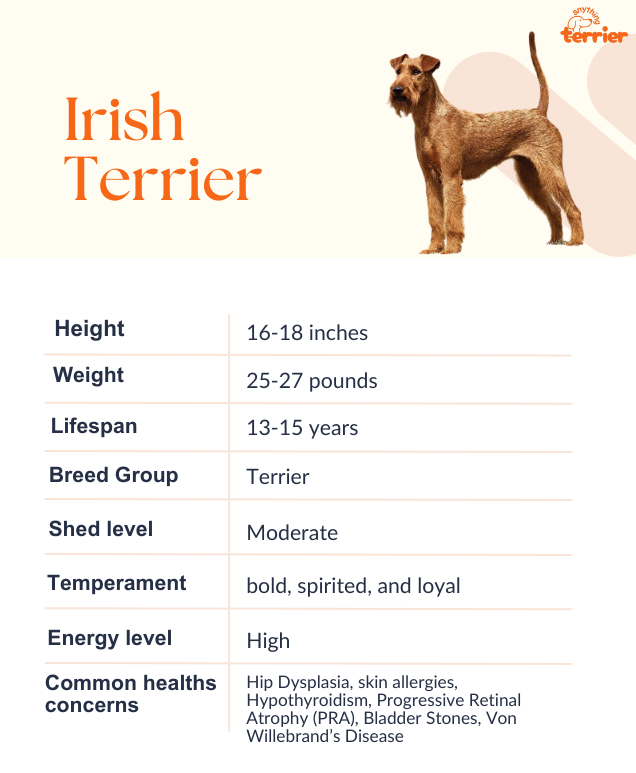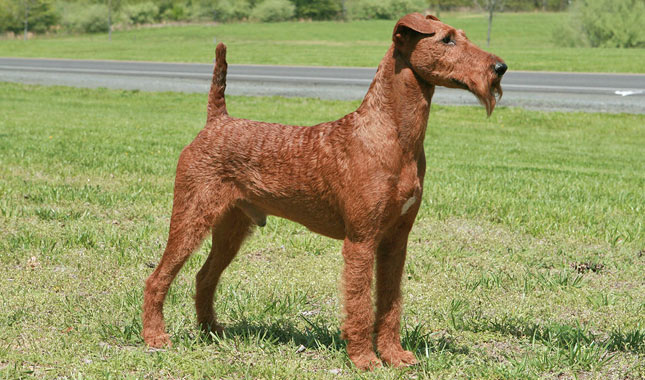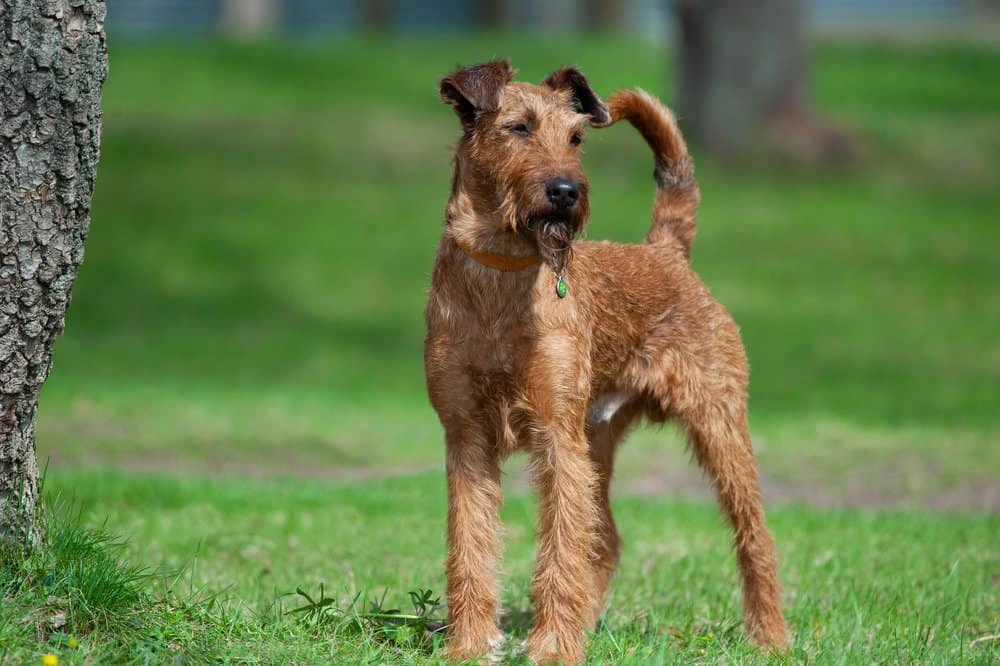The Irish Terrier is a lively and intelligent medium-sized breed with deep roots in Ireland. As one of the most ancient terrier breeds, it has long been valued as “the poor man’s sentinel, the farmer’s reliable partner, and the gentleman’s preferred companion.”
Tough and courageous, these dogs excel as both faithful companions and dependable watchdogs, all while maintaining a manageable size.
Irish Terriers form strong bonds with their human companions, though they tend to prefer being the sole pet in the household. Early and consistent socialization can help them adapt to living alongside other pets.
Their high energy levels demand regular exercise, which can make them a challenge for apartment dwellers or individuals with busy schedules.
Prospective owners should carefully consider these needs before welcoming an Irish Terrier into their home.
However, for those with the time, space, and dedication, these dogs make affectionate and loyal lifelong friends.
Irish Terrier History
The Irish Terrier is among the oldest terrier breeds, likely descending from the now-extinct black and tan terrier and a larger wheaten-colored terrier.
The breed first gained recognition around 1875, debuting at a dog show in Glasgow, Scotland. By 1879, two key Irish Terriers, Ch. Erin and Killney Boy, were producing champion offspring and are considered the foundation of the modern breed.
The 1880s marked a golden era for the Irish Terrier, making them Britain’s fourth most popular breed.
This period also sparked a pivotal change in canine culture.
Ear cropping, once a common practice for terriers and other breeds, became controversial when the Irish Terrier Club mandated in 1889 that dogs with cropped ears could no longer compete under Kennel Club rules.
Although the move caused outrage, it ultimately led to a complete ban on ear cropping across Britain.
Irish Terriers quickly gained popularity in the United States, with the breed’s first appearance at the Westminster Kennel Club in 1881 and its first AKC registration in 1885, attributed to a dog named Aileen.
By 1896, enthusiasts had established the Irish Terrier Club of America.
During World War I, Irish Terriers demonstrated exceptional courage and loyalty as messenger dogs and sentinels. Lt. Col. E.H. Richardson, commandant of the British War Dog School, praised them, saying, “Many a soldier is alive today through the effort of one of these Terriers… They are extraordinarily intelligent, faithful, and honest.”
Despite their remarkable traits, the Irish Terrier’s popularity has waned over time. While still celebrated at specialty shows, they are rarely seen in mainstream competitions.
Ranked 123rd out of 155 AKC-registered breeds, the Irish Terrier’s prominence may have received a boost from the 2007 movie Firehouse Dog.

Irish Terrier Size
Males typically weigh 27 pounds while females generally weigh 25 pounds.
Their height ranges from 18 to 20 inches at the shoulder.
Irish Terrier Personality
The Irish Terrier was bred to be a versatile dog, excelling as a companion, protector, and hunter.
With their spirited, adaptable, and loyal nature, they make for a wonderful pet — though their traits can sometimes be challenging.
Independent and intelligent, these strong-willed dogs can be feisty with other canines and require consistent mental stimulation through training and games, paired with plenty of physical activity.
While they need firm but loving guidance, Irish Terriers are deeply affectionate and typically friendly, even with strangers, making them more than just a one-person dog.
A puppy’s temperament depends on factors like genetics, training, and socialization.
Puppies with balanced temperaments tend to be curious and playful, comfortable with being held and meeting people.
When choosing a puppy, avoid extremes — steer clear of those who bully their littermates or shy away in fear.
Meeting at least one parent, ideally the mother, can give you insight into the puppy’s likely personality.
It’s also helpful to observe siblings or other relatives to better predict how the puppy will behave as an adult.
To raise a well-rounded Irish Terrier, early socialization is essential.
Exposing your puppy to various people, environments, and experiences helps build confidence and friendliness.
Puppy kindergarten classes are a great first step, as are visits to dog-friendly parks, stores, or bustling neighborhoods. Regular interactions with visitors will further develop your puppy’s social skills.
Irish Terrier Health Issues

The Irish Terrier is typically known for its robust health and relatively few common health issues.
Nonetheless, it is important for potential owners to be cognizant of certain health conditions that may affect this breed, such as:
Hip Dysplasia
Hip dysplasia is a common issue in many dog breeds, including the Irish Terrier. This condition occurs when the hip joint’s bones are misaligned, leading to friction and grinding.
Over time, this wear and tear can cause the joint to deteriorate, resulting in reduced mobility, pain, and arthritis.
While hip dysplasia can be inherited, other factors like exercise routines, diet, and weight management can influence its severity.
Maintaining a healthy weight and scheduling regular veterinary checkups are crucial steps in minimizing the risk and managing the condition effectively.
Cystinuria
Cystinuria is a condition where cystine crystals appear in the urine due to the kidneys failing to properly reabsorb the amino acid cystine.
This issue can lead to the formation of urinary stones, which, if untreated, may block urine flow and pose a serious threat to a dog’s health.
Irish Terriers are genetically predisposed to cystinuria, though it is relatively rare and most commonly affects males around the age of 4 to 5 years.
If diagnosed, veterinarians often prescribe a specialized diet designed to lower cystine levels in the urine and help prevent stone formation.
Hyperkeratosis
Hereditary footpad hyperkeratosis (HFH) is a hereditary disorder that results in the hardening and cracking of a dog’s footpads.
This condition is now uncommon among Irish Terriers, but the breed can still inherit the trait.
Although no specific treatment exists, genetic testing can reveal whether a dog is a carrier.
Thrombopathia
Thrombopathia is a disorder affecting blood platelets, leading to complications with clotting and an increased tendency for bleeding.
Caring for an Irish Terrier
Known for their bold and adaptable personalities, Irish Terriers are intelligent and full of energy. They need plenty of daily exercise to stay physically fit and mentally sharp.
Their signature wiry, red coat adds to their charm but requires regular grooming to maintain its vibrant appearance and texture.
On average, these dogs measure about 18 inches in height and weigh between 25 to 27 pounds.
Irish Terriers, known for their fiery red coats and spirited nature, are a delightful breed for any dog lover.
However, like any breed, they come with their own set of behavioral traits that require specific training approaches.
Here’s your guide to understanding and training Irish Terriers, ensuring a happy and well-behaved canine companion.
Understanding the Irish Terrier Temperament
Irish Terriers are famously energetic and assertive.
They are known for their intelligence, independence, and protective nature, making them excellent family pets and guard dogs.
However, their strong will and high energy levels can pose challenges in training if not handled correctly.
Basic Training Tips for Irish Terriers
- Start Early: Begin training your Irish Terrier puppy as soon as you bring them home. Early socialization and exposure to various people, environments, and situations will help mitigate aggressive tendencies and foster a well-rounded character.
- Use Positive Reinforcement: Irish Terriers respond well to positive reinforcement techniques. Use treats, praises, and play as rewards for good behavior. This breed can be sensitive to harsh treatment, so it’s important to avoid negative reinforcement, which can lead to stubbornness or aggression.
- Establish Leadership: Irish Terriers need to know who’s in charge. Establish yourself as the alpha of the pack through firm, consistent commands and by setting clear boundaries. This helps in managing their independent nature and ensuring they respect your authority.
Advanced Training Strategies
- Obedience Training: Enroll your Irish Terrier in obedience classes to reinforce basic commands and promote good behavior. These classes also provide opportunities for socialization with other dogs.
- Agility Training: Leverage their high energy with agility training, which is both mentally and physically stimulating for Irish Terriers. This can include obstacle courses that challenge their problem-solving skills and satisfy their need for activity.
- Routine Exercise: Consistent and sufficient exercise is crucial for this breed. Regular walks, runs, and play sessions will help manage their energy levels and prevent behavioral issues like chewing, digging, or excessive barking.
Behavioral Issues and Management
Irish Terriers may exhibit typical terrier behaviors such as digging, barking, and chasing.
Managing these behaviors involves providing ample physical exercise and mental stimulation.
Additionally, reinforce training commands that counteract these behaviors—teach commands like “leave it” or “quiet” to curb chasing and barking.
Irish Terrier Grooming Guide
Irish Terriers, known for their distinct wiry coats and dashing good looks, require regular grooming to maintain their appearance and health.
This guide provides essential tips and strategies for grooming your Irish Terrier, ensuring your furry friend stays clean, comfortable, and stylish.
Understanding the Irish Terrier Coat
The Irish Terrier has a dense, wiry coat that is somewhat unique among terriers.
It’s important to understand the structure of their coat to effectively groom them.
The outer layer is harsh and wiry, while the undercoat is softer and provides insulation.
Routine Brushing: Keeping the Coat Healthy
- Frequency: Brush your Irish Terrier at least once a week to prevent matting and reduce shedding.
- Tools: Use a slicker brush and a metal comb. The slicker brush removes loose fur and debris, while the metal comb works through any tangles and mats.
- Technique: Always brush in the direction of hair growth to avoid discomfort and evenly distribute natural skin oils.
Bathing Your Irish Terrier: Less is More
- Frequency: Bathe your Irish Terrier every four to six weeks. Over-bathing can strip the coat of its natural oils, leading to dry skin and irritation.
- Shampoo: Choose a mild dog shampoo formulated for wiry coats. Harsh shampoos can damage the texture of their hair.
- Drying: After bathing, gently pat the coat dry with a towel and use a low-heat blow dryer to finish. Avoid high heat as it can cause the coat to become brittle.
Professional Grooming: Hand-Stripping vs. Clipping
- Hand-Stripping: This traditional method involves plucking the old outer coat by hand or with stripping tools. Hand-stripping helps maintain the coat’s natural texture and color, which is especially important for show dogs.
- Clipping: An easier and more common method for pet owners, clipping shortens the coat with clippers. While more convenient, it can soften the coat and alter its color over time.
Nail Care, Ear Cleaning, and Dental Hygiene
- Nails: Trim your Irish Terrier’s nails every three to four weeks to prevent overgrowth and splitting.
- Ears: Check and clean the ears weekly to prevent wax buildup and infections. Use a vet-approved ear cleaner.
- Teeth: Brush your dog’s teeth several times a week with canine toothpaste to promote oral health.
Seasonal Considerations: Adapting to Weather Changes
Adjust your grooming routine according to the seasons.
In winter, you might need to bathe your dog less often due to less outdoor activity.
In contrast, summer might require more frequent baths and brushing as they spend more time outdoors.
Irish Terrier FAQs
Is an Irish Terrier a good family dog?
Absolutely!
Their loyal and loving temperament makes Irish Terriers wonderful family pets, and they naturally adapt to the energetic pace of children.
Are Irish Terriers high-maintenance?
Irish Terriers need plenty of physical activity, mental engagement, and consistent, patient training, which some pet owners might find demanding.
Do Irish Terriers bark a lot?
As a breed, they are alert and can be keen watchdogs, which means they will bark to alert their owners of anything unusual or when someone approaches their home.
However, their barking is usually purposeful rather than constant. With proper training and socialization,
Irish Terriers can learn to moderate their barking and respond appropriately to their environment.
Are Irish Terriers cuddly?
They tend to form strong bonds with their owners and can be quite cuddly, especially when they’ve burned off some of their abundant energy.
They enjoy being close to their human companions and can be very loving, although they may not always seek out constant physical affection like some other dog breeds.
Their cuddliness can vary from one dog to another, as with any breed, but many Irish Terrier owners report that their pets enjoy snuggling up when they settle down.
Are Irish Terriers noisy?
Irish Terriers are moderately noisy. They have a reputation for being alert and will often bark to make their presence known or to alert their owners to something unusual.
However, they are not typically considered constant barkers. The amount of noise an Irish Terrier makes can often be managed with proper training and socialization from a young age.
By teaching them when it’s appropriate to bark and when it’s not, you can help control their vocalizations.
Like any dog, their environment and upbringing will play a significant role in how vocal they become.

Dr. Emily Harper is a California-based veterinarian specializing in terrier breeds. With years of experience in veterinary medicine and a passion for terrier care, she focuses on breed-specific health, grooming, and behavior.
Emily’s journey began with a love for dogs, leading her to pursue a career in veterinary medicine and develop expertise in terriers. She has authored numerous articles on terrier health and grooming and educates pet owners on providing the best care for their companions.
In her free time, Dr. Harper enjoys hiking California’s trails with her rescue terriers, Max and Bella, and spending time with her family.


